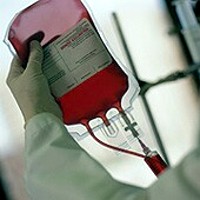30 October 2014. Medical and biochemical researchers at University of British Columbia in Vancouver, Canada designed a polymer antidote for heparin that in lab animals neutralizes anti-coagulant activity and appears to be well tolerated. The team led by chemistry and pathology professor Jayachandran Kizhakkedathu published its findings yesterday in the journal Science Translational Medicine (paid subscription required).
Heparin is an anti-coagulant drug given to patients with medical conditions that lead to blood clots or to prevent formation of clots during surgery and with catheters. The drug works by diminishing the blood’s ability to clot, but if overdosed or complications develop, can lead to excessive bleeding. In these cases, an antidote is needed to reverse the anti-coagulant action of heparin.
Antidotes to heparin themselves, however, can lead to complications such as low blood pressure and in some cases a serious reaction similar to life-threatening anaphylactic shock, with toxicity varying from patient to patient. Also, while heparin is a common established drug — it is now available as a generic — its various forms have somewhat different chemistries, making it difficult to come up with a single antidote for all types in its class.
Kizhakkedathu and colleagues sought to develop a single antidote for heparin, what they call a universal heparin reversal agent, which would also be safe and simple in design to keep it inexpensive to produce. The team designed a new type of positively-charged polymer molecule that neutralizes the negatively-charged complex of heparin and proteins that breaks up clots and prevent further clotting. In addition, the polymer is coated in a protective layer of polyethylene glycol, a common additive to drugs, which in this case prevents it from interacting with other charged molecules in blood.
The researchers tested the polymer antidote in lab blood samples to find the most effective formulation, then tested that formulation with lab rats and mice. Tests with animals showed their universal reversal agent works as well or better in neutralizing the anti-coagulant activity of various heparin compounds. The team also tested dose tolerance of the antidote, and found at all levels tested, the mice survive with no differences in body weight or signs of toxicity after 29 days, compared to a control group. Likewise, analysis of tissue samples from livers, kidneys, and spleens in the test mice shows no damage after 29 days.
Kizhakkedathu and UBC co-authors Rajesh Shenoi, Cedric Carter, and Donald Brooks are the inventors of the technology protected under a U.S. patent and assigned to the university. The researchers say they plan to further develop the polymer antidote for clinical trials in 3 to 5 years.
Read more:
- New Coating Material Stops Blood Clots, Bacterial Films
- Chip Emulates Human Airway Muscles to Test Asthma Treatments
- Engineered Fluid Devised for Lubricating Joint Cartilage
- Ultrasound-Triggered Hydrogel Shown to Deliver Cancer Drug
- More Efficient Growth Factor Delivery Technique Devised
* * *


 RSS - Posts
RSS - Posts
You must be logged in to post a comment.